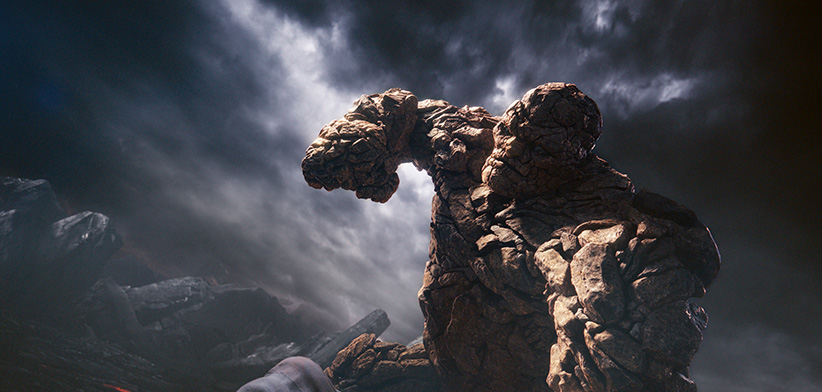The not-so-Fantastic Four: The fall of Marvel’s flagship team
How did the world’s most important superhero franchise get crushed by Ant-Man?
The Thing’s stone body gives him epic strength and makes him virtually indestructible. (Twentieth Century Fox)
Share

Can the Fantastic Four ever be popular again? Even the studio that’s making their $122-million movie doesn’t act as if it thinks so. The publicity for the reboot of the Marvel superhero team, their first film since 2007, has been half-hearted. “They don’t know how to market it,” says Sarah Marrs, who writes about film for Lainey Gossip. “Every trailer has emphasized a different angle. They’ve changed the key art a couple of times, and it’s like maybe they don’t know what they have.” Scott Mendelson of Forbes noted that the first trailer “promised sci-fi horror,” while the second trailer made it look like “a generic, dark and gritty remake.” (Update, Aug. 10: The Fantastic Four amassed a mere $25.7 million in its North American weekend debut at the box office.)
Fox bought the movie rights to the Fantastic Four decades ago, back when they were considered better film prospects than Iron Man or Captain America. But that doesn’t mean the studio has much enthusiasm for them: Ant-Man director Peyton Reed, who was dismissed from a previous Fantastic Four movie during the development stage, told Yahoo he felt Fox viewed them “like B-level characters. I never felt like they understood the real strength of that property.”
Yet, there was a time when the Fantastic Four was the most important superhero franchise in the world. When writer Stan Lee and artist and co-plotter Jack Kirby launched the team in 1961, it almost single-handedly created the Marvel superhero comics line and invented a set of new conventions for comic-book heroes. The stars were a self-centred scientist, his ditzy girlfriend, her dim-witted teenage brother and a rock creature with a working-class New York accent, four characters who frequently screwed up on the way to winning, and constantly argued with each other.
Every superhero created after them owes something to their mix of heroism and irony, and some, like Pixar’s superhero family the Incredibles, are outright tributes. But that just means historians and fans acknowledge the team’s importance; it doesn’t mean most people know who they are. And both as a comic-book property and a movie property, they’ve been on the outs for a long time. Brian Cronin, author of the blog Comics Should Be Good, says the Fantastic Four started to lose their grip “some time in 1981 or 1982,” when the X-Men, a team once so unpopular, it had been cancelled for years, “passed the Fantastic Four as Marvel’s flagship team.” The X-Men even beat them at the movies: Fox also owns the movie rights to that team, and has put most of its energy into making and marketing X-Men movies.
So what’s stopping the Fantastic Four from regaining popularity? Marrs thinks they’re too much like a sitcom family, and not angsty enough. “In 2008, the double whammy of The Dark Knight and Iron Man proved that what people like about superheroes is people who have a lot of drama. The Fantastic Four are not very dramatic. Their main villain is a complete goofball,” she says, referring to Doctor Doom, a man in a metal suit obsessed with proving he’s a better scientist than the hero. It doesn’t help that the premise is tied to the 1960s: The team gets their powers by stealing a rocket and trying to beat the communists into space, where they’re bombarded by cosmic rays. Reed advocated setting the films in the 1960s, but Fox keeps trying to make them contemporary, and it may be that they aren’t. “They’re playing the dark and gritty thing,” Marrs continues, “and that’s 100 per cent wrong, because they aren’t dark and gritty characters.”
Still, don’t expect the Fantastic Four to disappear from movies any time soon. If Fox stops making these movies altogether, the rights will revert to Marvel’s own studio, and Fox isn’t about to let that happen. “I don’t think there’s a single creative spark behind the movie,” Marrs says. “I think Fox is just determined not to lose the rights back to Marvel. Fox and Marvel hate each other.” Fox has already talked about crossing the characters over with the more popular X-Men as a way of keeping them in the movies, regardless of this film’s performance. Fifty years ago, the Fantastic Four were the model for every other superhero story. Now, they’re surviving by the one superpower they have left: licensing law.